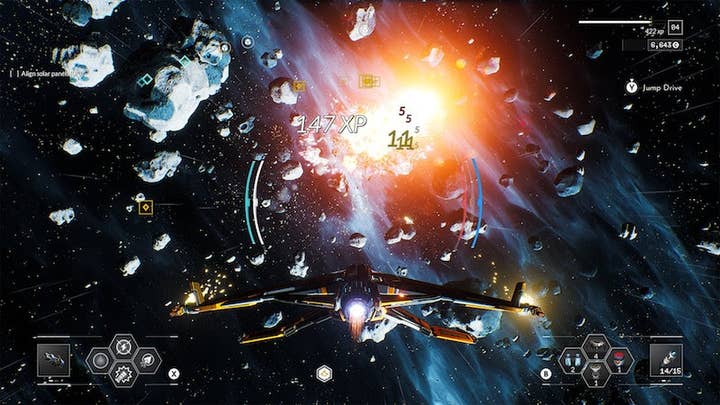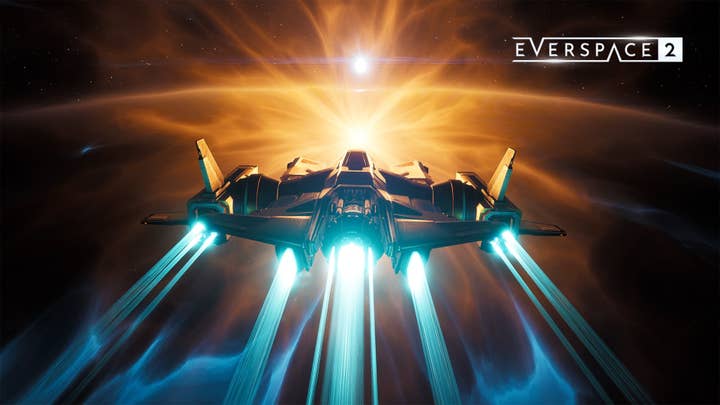Everspace 2: Rockfish's not so difficult second album
So much has fallen into place with Everspace 2, says CEO Michael Schade, "we sometimes wonder if there's anything we're missing"
Second albums are supposed to be difficult, but Rockfish CEO Michael Schade is having a very different experience. The Hamburg-based studio spent years piecing together a community of players around its first game, Everspace, but its recently announced sequel has presented few of the difficulties associated with a sophomore effort.
For Schade, that sense of calm and confidence is less comforting than one might expect. Rockfish itself rose from the ashes of his previous company, Fishlabs, which went bankrupt in 2013. Everspace was the first attempt at a PC game from a group of mobile developers fleeing the collapse of the premium market on the app stores. Every scrap of its success was hard won.
Speaking with GamesIndustry.biz at Devcom, the day before Rockfish is due to officially announce Everspace 2 at Gamescom: Opening Night Live, Schade is clearly grappling with just how right everything feels. This isn't how it's supposed to be; the 'disconcertingly simple second album' just doesn't have the same ring to it.
The very fact that Everspace 2 is in the line-up for Geoff Keighley's curtain-raising event at the world's biggest consumer games expo is symbolic of just how far Rockfish has come. With Everspace, Schade admits, "we were just mobile guys trying to make a PC game," but the sequel arrives on the back of more than a million sales across PC and consoles, and a community that Rockfish has built through a huge amount of diligent effort.
"The project is much, much bigger. The budget is twice as high"
"The project is much, much bigger," Schade says. "The budget is twice as high. The team is now 20 people. We're working with AAA external partners, because when you do open world you need a lot more content, so we're working with Streamline Studios."
The fact that Everspace 2 will be an open world game is perhaps the stiffest test that Rockfish faces. Strangely, though, it's also a source of confidence, as it pushes the series into territory that fans have been demanding since the Everspace Kickstarter first launched in August 2015.
"Everspace has an average rating of eight out of ten, so you could say it's a good game. It sold a million copies, so you could say it's a success for an indie. But the most common critique is 'Oh, it's a roguelike. I wish it was Freelancer.'
"This is what most space game fans want; they want a modern day Freelancer... They want an open world, with a story, lots of content, exploration, action, trading, mining. If you do a space sim, you have to do a lot of different gameplay types. You don't get away with not doing mining or trading. They're going to roast you."

As elevator pitches go, 'Diablo meets Freelancer' isn't half bad, and that's what Rockfish is bringing to the table with its second game. Everspace 2 will retain the fast-paced action and the sweeping, highly-saturated cosmic vistas of the first game, but it will be broader and grander in just about every other respect -- more detail, more freedom, "dozens" more ships.
In the games business, sequels are always bigger, but they can occasionally seem that way by default. With Everspace 2, Schade says, this is the direct result of thousands upon thousands of comments and requests from the first game's audience.
"Since we're in a financially stronger position, we can now deliver what our fans really want," he says. "[With Everspace] we just didn't have the budget to make a proper open world. Because, let's face it, you do a roguelike when you don't have the budget to make a proper open world game.
"There's nothing wrong with that, but we thought it was an opportunity to introduce the roguelike to a new audience, and that was a misconception. The challenge is that users see the pictures and the trailers, but a lot of them don't read [the description]. And the higher the discount, the less people read.
"They just see the screenshots and buy the game. They play it, they die, they have to start over. They say, 'What's that? I thought it was open world.'"
"This is what most space game fans want; they want a modern day Freelancer... They want an open world"
Hearing Schade describe expectations spiralling beyond the intended marketing message calls to mind No Man's Sky. Rockfish was more careful with its messaging around Everspace than Hello Games, for sure, but Schade has still picked up some valuable lessons about the (often erroneous) ideas an evocative screenshot can create in the mind of an excited potential customer. Now that the studio is moving into an open world, the example of No Man's Sky is even more relevant.
"[Hello Games] didn't deliver on the promise in the first place, and now they're making up for it. I think it's remarkable, because a lot of studios don't do that," Schade says. "On the other hand, when they said 'We're going to do a space sim, and you can fly and land on planets,' but they hadn't done a space sim before? We had already done space shooters and we thought, 'Good luck, we'll see how that goes.'
"And to a certain degree, Everspace wouldn't have been such a success if No Man's Sky didn't have a troubled launch. It was the worst rated game in the history of Steam or something, and a week later we came out... It was great in terms of visibility, but we really had to make sure there were no misconceptions about what the game is.
"This time around, I really think we have a chance to control the message much better. Honestly, I'm super confident that the vast majority of our fans will be very happy with what they see."

Rockfish is also building from a position of strength financially. The success of Everspace has left the studio with money in the bank, and it continues to bring in revenue. With a few discount tiers still to explore, Schade expects the first game to provide a solid base for another year -- which is exactly when Rockfish expects to launch Everspace 2 in Early Access on Steam.
First, though, is another Kickstarter campaign, a move that might seem unusual for a studio with a million-selling game, money in the bank, and a polished, playable demo at both Gamescom and PAX West. For Rockfish, however, returning to the crowdfunding platform is as much about marketing and testing as the money. This is evident from its decision to offer access to the two-hour demo to every single Kickstarter backer.
"No Man's Sky was the worst rated game in the history of Steam, and a week later we came out... It was great in terms of visibility"
"They can play the game right away," Schade says. "It has to be one of the very few Kickstarters where you get the actual game after it has ended. We want to double down and make the studio even more financially independent, but we also want the Kickstarter to have this early feedback. Everspace wouldn't have been such a good game without feedback from the community."
Gearbox had a similar idea behind its Kickstarter campaign for Homeworld 3. And while Schade is clear that the target for Everspace 2 will be more than $1, the amount Rockfish does set when the campaign launches on October 2 will serve the dual purpose of raising money and creating a very specific kind of engagement.
"We're going to have stretch goals if things are successful," Schade says. "We have lots of crazy ideas, and Kickstarter is the best tool to find out, beyond the base game... What else is there? What else are the players really excited about?
"You can do this with forums, but when people vote with their wallet that's a different thing. It's a completely different level of engagement with backers versus your average community members. They also provide valuable feedback, but they're not as incentivised and not as eager."
Speaking after PAX West, Schade says that Rockfish received some negative feedback for the enigmatic "2021" release teased at the end of the Gamescom: Opening Night Live announcement. Two years was a long time to wait for an indie game, some parts of the community said, regardless of how beautiful and exciting it looks. However, while the final release on all platforms will be in 2021, both the Kickstarter (with a playable demo) and Steam Early Access will arrive before then.
These are key access points for die hard fans, Schade says, and they are also vital processes in how Rockfish intends to shape the game. Everspace had a Kickstarter, a closed alpha and a closed beta, all before it launched in Early Access. "We had four major releases during the nine months of Early Access, too," Schade says. "By the end, we had 93% positive reviews on Steam."
That 2021 date was partially due to announcing Everspace 2 for Xbox and PlayStation, but there is another platform it won't reach until that time: the Epic Games Store. Everspace 2 is made with Unreal Engine 4, and Schade has been engaged in an uphill struggle against parts of the community who appear convinced that it is only a matter of time before the sequel is revealed as the latest EGS exclusive.
"Valve has the best platform, by far, to roll out a game as an independent developer. It's by far the best tools and the best communities"
Schade admits that there were conversations with Epic about Everspace 2, but Rockfish never seriously considered pursuing exclusivity. As much as anything else, Everspace was a game built in tune with its community, and that community really took off on Early Access. Steam is very much the series' home, and the source of more than 50% of the game's revenue to date. At this point in time, Schade says, the Epic Games Store simply doesn't have the tools that Rockfish needs to build its sequel, and to build an even larger community around that sequel.
"Plus, our hardcore fans are on Steam," Schade adds. "They have already said 'Please don't do it. We just don't want it.' You don't even have to discuss whether this is reasonable or not. If they don't want it, they don't want it, and more than 100,000 people bought Everspace in Early Access. They would be mad at us.
"Without Epic, Rockfish and Everspace wouldn't exist, but it's the same with Steam. Without Steam, we wouldn't exist... In our case, it doesn't make sense. We need Early Access, the full feature set, the forums, the constant updating, the whole infrastructure. Valve has the best platform, by far, to roll out a game as an independent developer. It's by far the best tools and the best communities. This is exactly what we need."
Schade acknowledges that, for smaller developers, exclusivity can be both valuable and vital, but the decision to stick to its original plan is already paying off. After Gamescom: Opening Night Live, Valve promoted a handful of games from the line-up on Steam's homepage. Everspace 2 was among them, and at the time of writing, it had been added to more than 20,000 wishlists -- five times more than Everspace in the same time period.
"It's so absurd how many things are falling together in a really positive way right now," Schade says, shaking his head. "We sometimes sit and wonder if there's anything we're missing. You know our history. We had some troubles, some challenges. We lost the studio twice and had to start all over, and now it's like 'don't screw up, don't screw up, don't screw up.' Is there anything that we're missing?
"I watched our teaser trailer 50 times at home -- again and again and again and again -- to see where is there room for improvement. Then I realised I was just enjoying watching our trailer for three hours straight. And then I played the game again, and it's good. It's just generally good.
"I think it's the first time in my business life that I'm not concerned at all, in terms of our fans liking what we're doing right now. I could be wrong, but man, if we're wrong about this, I don't know what else to do."
GamesIndustry.biz is a media partner of Devcom 2019. We attended the show with assistance from the organiser.


